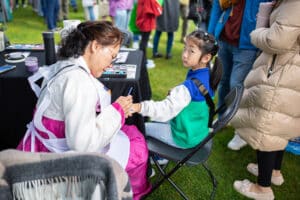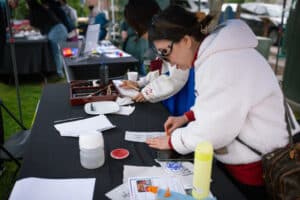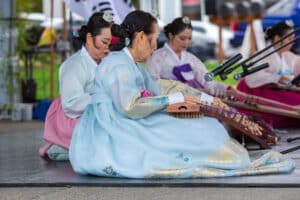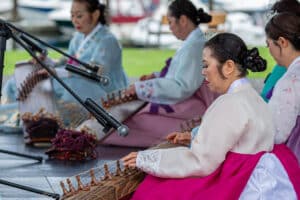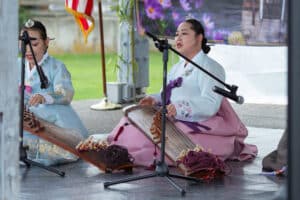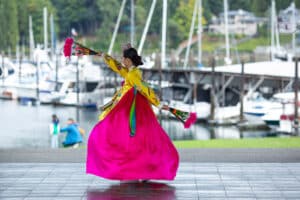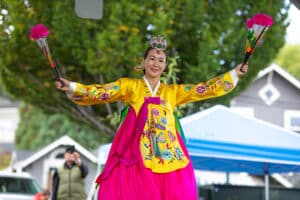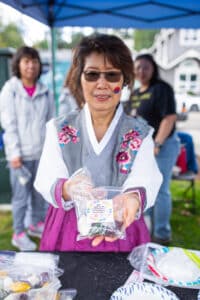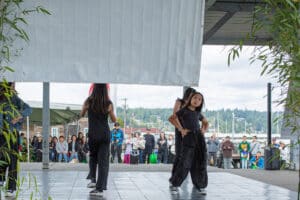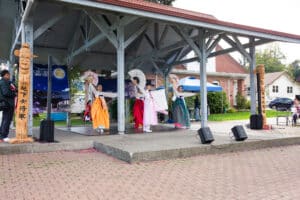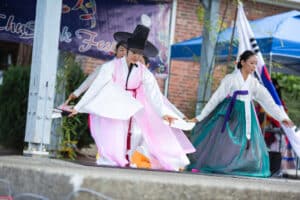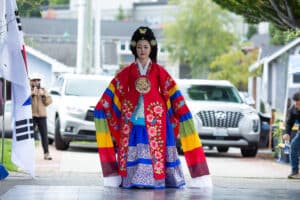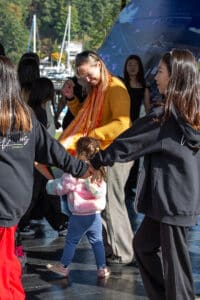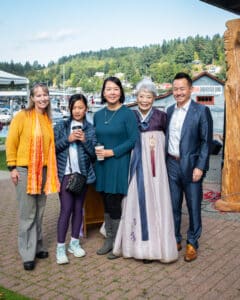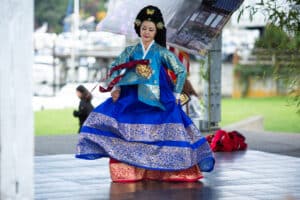Arts & Entertainment Community
Korean ChuSeok Festival honors ancestors and celebrates harvest
Editor’s note: Patsy Surh O’Connell organizes the local ChuSeok Festival. An earlier version of this story misstated that fact.
Hundreds gathered in Skansie Park on Sept. 30 for Gig Harbor’s third annual Korean ChuSeok Festival, a free and family-friendly event sponsored by the Asia Pacific Cultural Center.
Often referred to as the “Korean Thanksgiving”, ChuSeok (추석), or hangawi (한가위), is recognized as one of South Korea’s most important traditional holidays. The more than 2,000-year-old holiday is a time for families to return to their hometowns, honor their ancestors and celebrate the harvest. ChuSeok means “autumn evening.”
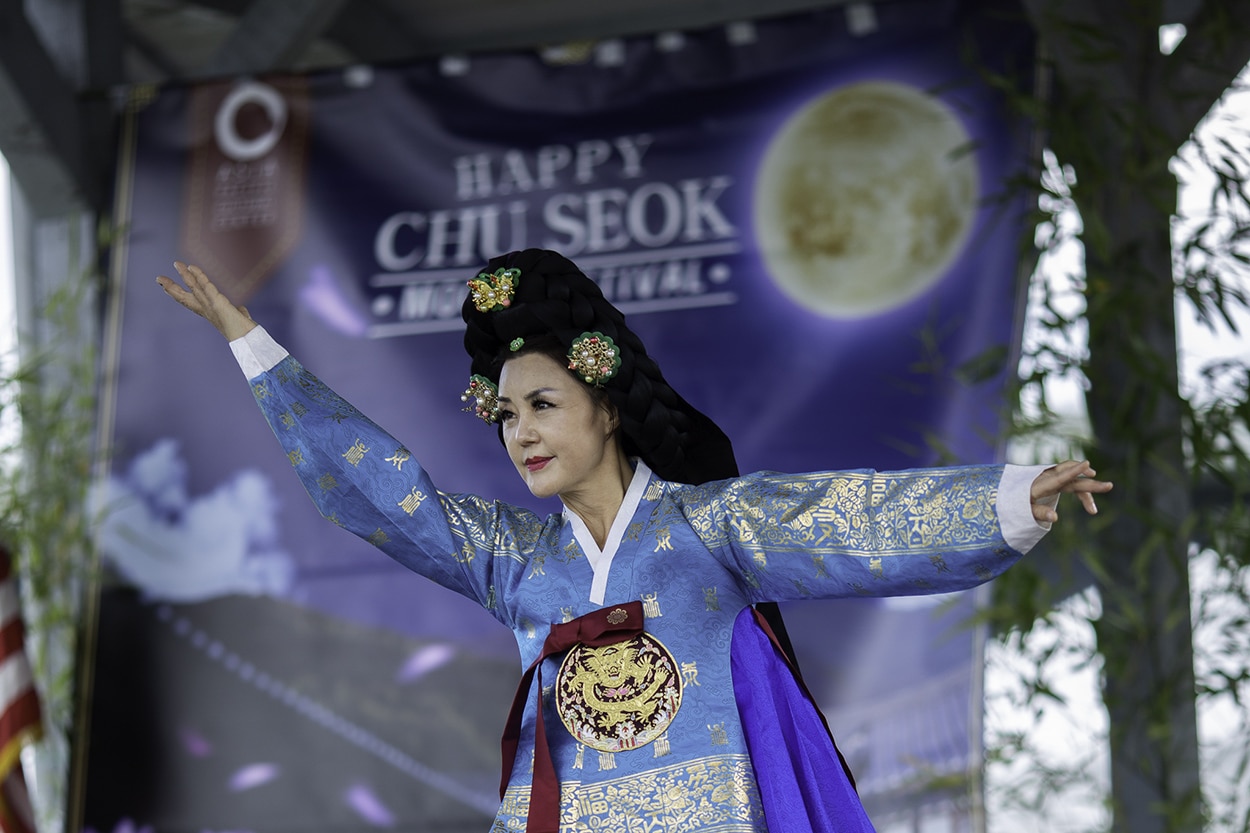
The 2023 ChuSeok Fesitval at Skansie Park in Gig Harbor. Photo by Julie Warrick Ammann
Food and fun
Longtime Gig Harbor resident Patsy Surh O’Connell, president of the Asia Pacific Cultural Center and the organizer of the festival, said the festival is a way to honor their rich cultural heritage and share the wonders of Korea with the greater community. The festival allowed people to experience Korean culture, cuisine, music, arts and community.
Some of those traditions shared at the festival included crafting traditional ChuSeok rice cakes known as Song-pyeon 송편. For some, family time during ChuSeok involves sitting around a table together and rolling rice dough into small half-moon shapes. The story goes that you need to make Songpyeon beautiful to get married and have a pretty daughter.
Volunteers demonstrated craft projects. Others filled small plastic bags with orange, red, purple, and white colored Song-pyeon for distribution to festival goers. The colorful rice cake dough includes ingredients like mugwort, pumpkin and purple sweet potato. Biting into a SongPyeon is a foodie’s delight, each little half-moon teat with a different filling, such as honey and sesame.
Members of the Korean Artists Association provided face-painting for kids and wrote names in traditional Korean characters.
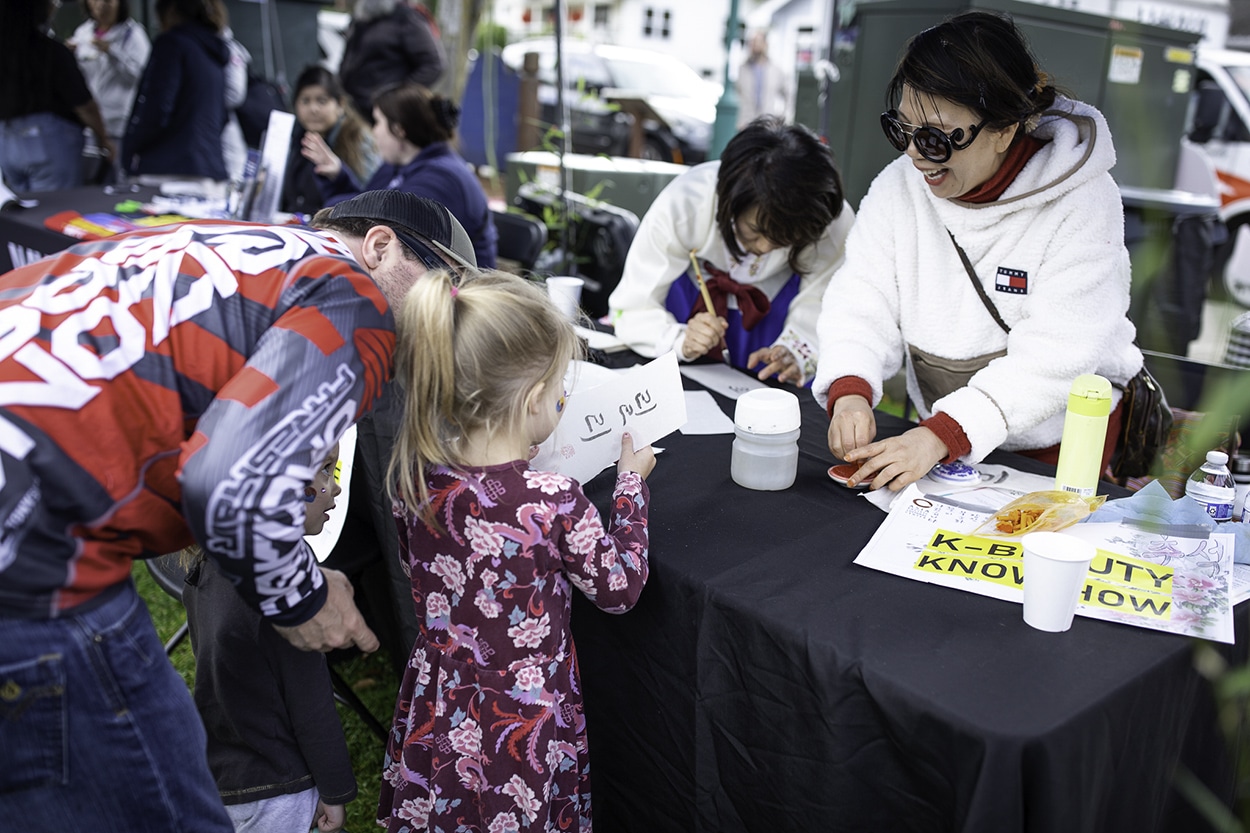
The 2023 ChuSeok Fesitval at Skansie Park in Gig Harbor. Photo by Julie Warrick Ammann
Traditional dance and music
The Morado Dance Team captivated the crowd with their grace and elegance as they performed four traditional Korean dances.
The skilled dancers were adorned in colorful gowns layered in translucent fabrics. They glided across the stage with airy lightness, fabric flowing with each lyrical arm movement set to a beating traditional soundtrack. The dance team practices in Federal Way twice a week.
The dances performed: Ip Choom, Fan Dance, Hanryan Moo, and the drum dance. Tae Pyung Mu, performed by Jin Sook Yank, is a dance believed to have been performed in the ancient Korean courts as a prayer for peace and prosperity.
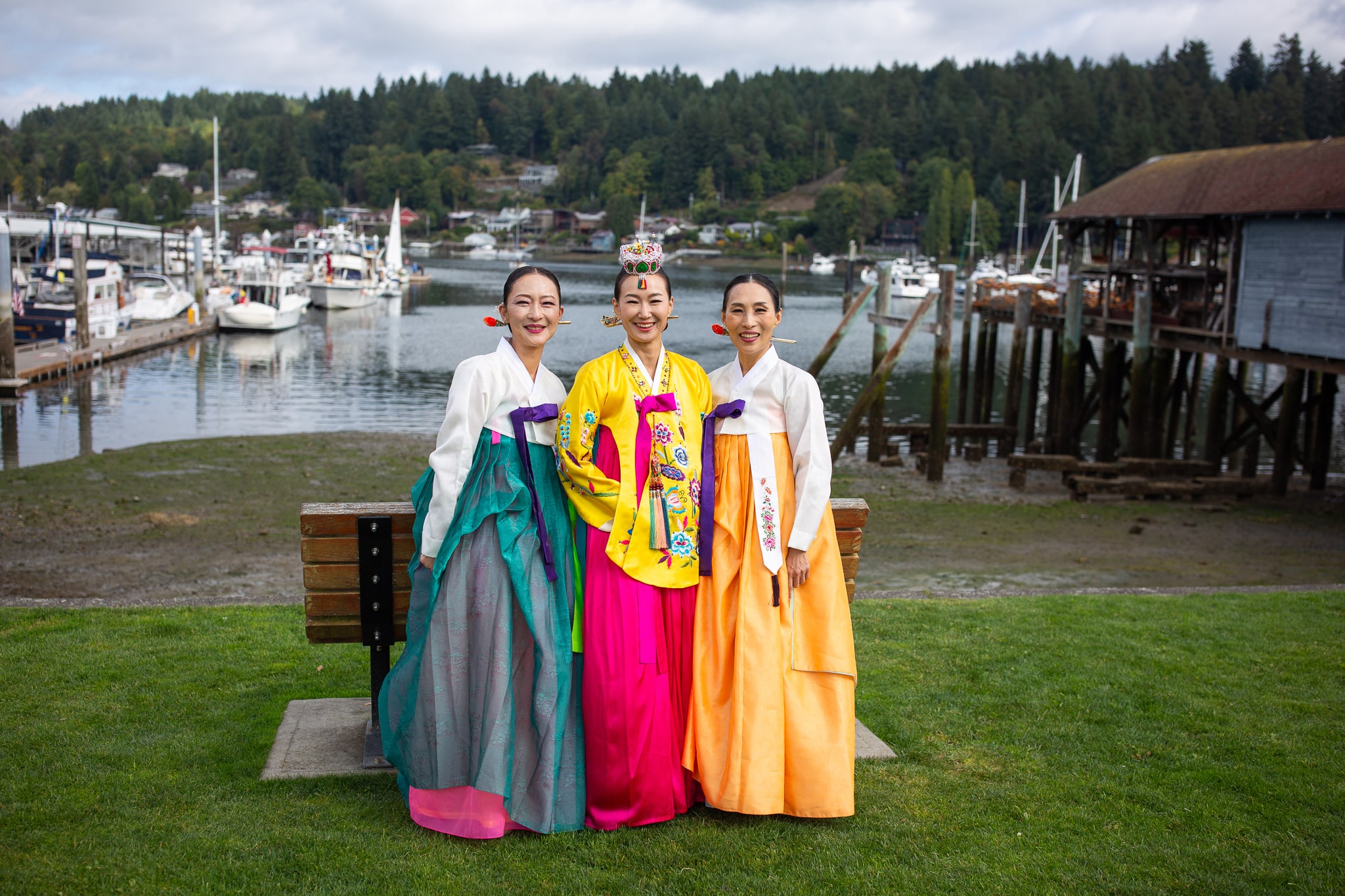
Minos Kim, Christie Lee and Jinny Kwak of the Morado Dance Team pose after a performance. Photo by Julie Warrick Ammann
Traditional Korean music serenaded the festival. Musicians, sitting on the stage floor, plucked the strings of a kayagŭm, a kind of Korean zither with 12 silk strings, recognized as the national instrument of Korea. The musician positions one end of the instrument on their right knee while placing the other end on the floor. The kayagŭm emits a gentle and elegant sound, and plays an important role in the cultural life of Korean people.
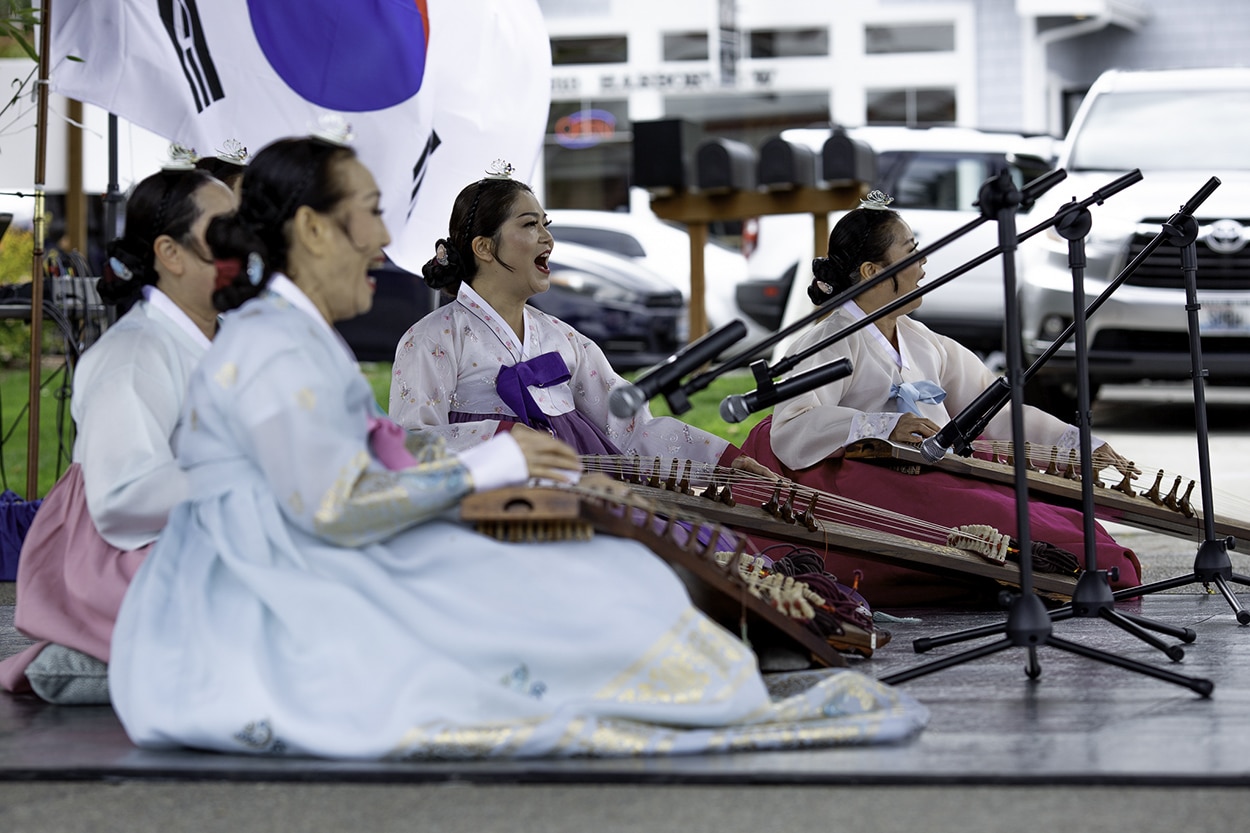
The 2023 ChuSeok Fesitval at Skansie Park in Gig Harbor. Photo by Julie Warrick Ammann
K-pop energy
The festival wasn’t all about the past. The volume rose and energy jumped with K-pop performances from a youthful Bellevue dance troupe. Now an international sensation, K-pop is a popular form of music that originates from South Korea. As the music blew from speakers across the harbor (and maybe all the way to Tacoma), teens and tweens joyously bounced, posed, shook and strutted across the stage dancing to K-pop.
Pierce County Council Member Robyn Denson and Pierce County Prosecuting Attorney Robert Yu served as Masters of Ceremony of the Gig Harbor ChuSeok Festival. Also in attendance were Gig Harbor Mayor Tracie Markley, the Asia Pacific Cultural Center Executive Director, Faaluaina (Lua) Pritchard, and many volunteers from the Korean Community.
Proud of their heritage
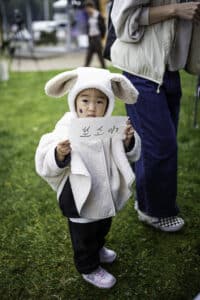
The 2023 ChuSeok Fesitval at Skansie Park in Gig Harbor. Photo by Julie Warrick Ammann
Gig Harbor resident Eunice Setiawan, a volunteer, said the festival is about “being thankful and feeling blessed.” Her two daughters, ages 8 and 10, accompanied her to the festival.
“The turnout was great,” Setiawan said. “A lot of kids from the kid’s school came out.
“Our girls were proud of their heritage.”
The idea of not having to cross the bridge to “find diversity” inspired Setiawan to bring this festival to Gig Harbor. Setiawan also pointed out that Gig Harbor is home to many Korean-owned businesses. They include Domo Sushi, Tokyo Teriyaki, Milkvue Handcrafted Donuts and Coffee, Yang’s Nursery & Botanical Gardens, and several of the dry-cleaning businesses in town.
Crossing the bridge is what a young pilot from Auburn did to attend the festival. “I fly over Gig Harbor,” said the pilot. On Saturday, he took in the view from the ground, marveling at Gig Harbor’s natural beauty on the waterfront, while celebrating a Korean holiday that gives gratitude to his ancestors and seeks blessings for a prosperous year ahead.
Photo gallery
Click on any image below to view a gallery of photos from the ChuSeok Festival.


